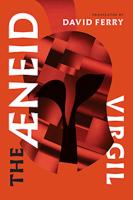
Chicago (2017) h/b 415pp £26.50 (ISBN 139780226450186)
In one of several eulogistic comments appearing on the back of this book, we read that ‘there is no better poet on the planet than David Ferry’. A poet, then, to match Rome’s greatest poet. The metre chosen by F. is, he tells us, the iambic pentameter: the information is useful, since all too often any resemblance to the ‘classic’ iambic pentameter of, say, Dryden or Pope is well-nigh impossible to discern (lines such as ‘The servants Sagaris and Phegeus together could hardly/Carry the weight of it on their straining shoulders’ are hardly, if at all, distinguishable from prose [5.356-7]). F.’s Muse, be it added, takes longer than that of the Mantuan to take wing: contrast the 1,232 lines of F.’s book 6 with Virgil’s 901 lines, or the 993 lines of F.’s book 4 with Virgil’s 705.
How does F. rise to the challenge of translating some of the most famous lines in all literature? At 1.462, V. wrote sunt lacrimae rerum et mentem mortalia tangunt. John Conington offered ‘Tears haunt the world; men’s fortunes touch men’s hearts’—a pretty good shot, one may feel. F. gives ‘These are the tears of things for what they were, / And what has become of them; the story of / The mortality of men strikes to the heart’. Or, at 4.625, exoriare aliquis nostris ex ossibus ultor, F. offers ‘Arise from my bones, whoever it is you are/ To pursue the Dardanians …’- but where is that emphatically placed ultor, whom we of course know to be Hannibal? Try 6.743 quisque suos patimur manes: in F. this becomes ‘This must / For each of us be undergone’, but manes remains untranslated—perhaps, to be fair, it cannot be translated.
Indeed, can a great poem be transmuted into the poetry of another language, another time? F. says, with Dryden, that he has done ‘great harm to Virgil’. Then how can F. render ‘Virgil’s voice telling it as it is, in his truth-telling pitying voice’? The late David West believed that nowadays a prose rendition was preferable to a long narrative poem, and succeeded admirably in his edition for Penguin; the reviewer shares his opinion (and admits to preferring, for Homer, the ‘Wardour Street’ English of Lang, Leaf and Myers to the War Music of Christopher Logue). F.’s version, with no notes or commentary or even dramatis personae, is designed for the reader with no Latin who yet wishes to engage with the Aeneid (for it cannot be used as a ‘crib’: for that, go to West or the Loeb Library translation by Fairclough/Goold). Whether, or the degree to which, he succeeds will be up to the individual reader to decide.
Tennyson called Virgil ‘wielder of the mightiest measure / Ever moulded by the lips of man’, thus giving F. a superhuman task. We shall recall Richard Bentley saying to Alexander Pope ‘It is a pretty poem, Mr Pope, but you must not call it Homer’; whether F. has given us a poem is debatable, but it is not Virgil.
Colin Leach
